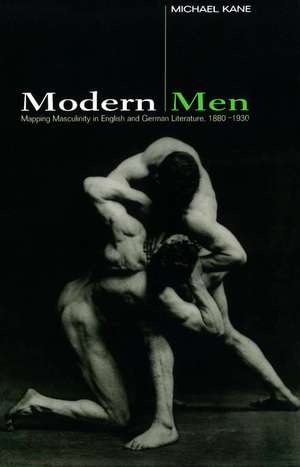Modern Men: Mapping Masculinity in English and German Literature, 1880-1930
Autor Michael Kaneen Limba Engleză Paperback – 30 noi 1999
Preț: 713.21 lei
Preț vechi: 829.32 lei
-14% Nou
Puncte Express: 1070
Preț estimativ în valută:
136.47€ • 142.89$ • 113.19£
136.47€ • 142.89$ • 113.19£
Carte tipărită la comandă
Livrare economică 10-24 aprilie
Preluare comenzi: 021 569.72.76
Specificații
ISBN-13: 9780304703104
ISBN-10: 0304703109
Pagini: 256
Dimensiuni: 156 x 234 x 19 mm
Greutate: 0.4 kg
Ediția:New.
Editura: Bloomsbury Publishing
Colecția Continuum
Locul publicării:London, United Kingdom
ISBN-10: 0304703109
Pagini: 256
Dimensiuni: 156 x 234 x 19 mm
Greutate: 0.4 kg
Ediția:New.
Editura: Bloomsbury Publishing
Colecția Continuum
Locul publicării:London, United Kingdom
Cuprins
Preface
Part I The 'Double'
Introduction
1. Jekyll and Hyde
2. After dualism: Nietzsche
3. Dorian Gray
Part II The Other - Narcissus and Salome
Scapegoats
4. The Trial of Narcissus: Wilde
5. The deaths of Narcissus: Hofmannsthal
6. The death of Salome
Part III The Nationalization of Narcissus
National Narcissim
7. Insiders / outsiders: Conrad's The Nigger of Narcissus and Stoker's Dracula
Part I The 'Double'
Introduction
1. Jekyll and Hyde
2. After dualism: Nietzsche
3. Dorian Gray
Part II The Other - Narcissus and Salome
Scapegoats
4. The Trial of Narcissus: Wilde
5. The deaths of Narcissus: Hofmannsthal
6. The death of Salome
Part III The Nationalization of Narcissus
National Narcissim
7. Insiders / outsiders: Conrad's The Nigger of Narcissus and Stoker's Dracula
8. North, South, East, West: Musil, Mann, Hofmannsthal
Part IV Kampf or Male Bondage
War, men and 'meaning'
9. Fighting men: Lawrence and London
10. Kampf: Walser, Kafka, Brecht
Conclusion: after patriarchy
Index
Part IV Kampf or Male Bondage
War, men and 'meaning'
9. Fighting men: Lawrence and London
10. Kampf: Walser, Kafka, Brecht
Conclusion: after patriarchy
Index













